
Publisher:
Bonnie King
CONTACT:
Newsroom@Salem-news.com
Advertising:
Adsales@Salem-news.com

~Truth~
~Justice~
~Peace~
TJP
Feb-24-2011 20:25

 TweetFollow @OregonNews
TweetFollow @OregonNews
Economics as Pseudoscience
Daniel Johnson Salem-News.comModern economics is based almost entirely on myths first pronounced by the 18th century moral philosopher, Adam Smith.
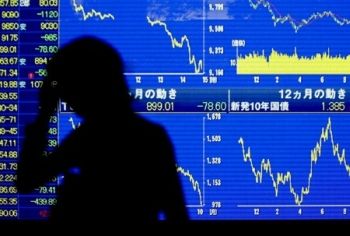 Courtesy: wikinoticia.com |
(CALGARY, Alberta) - I’ve been collecting quotes about, and insights into, economics since the 1970s. In fact, one of the first articles I ever published was "Superstition in Economics", in Humanist in Canada in 1974. Here is an outline of what I’ve accumulated so far.
If any field of study is a pseudoscience, it's economics. As Leonard Silk, late economics columnist for the New York Times (an economist himself) once wrote:
"Economists try to do what all scientists do—observe certain aspects of the natural or social world, gather data to measure those aspects, construct theories to explain the data, and test the theories against reality to validate or invalidate them. On the whole, however, economists do a weak job at all this. They commonly spend vast amounts of time observing each other's articles rather than reality. Their data are poor, and they devote little time to improving them. Their theories are rigid and mechanistic. And they rarely discard them unless some academic or government position is at stake." (Economics in Plain English)
Or the late Harvard economist John Kenneth Galbraith:
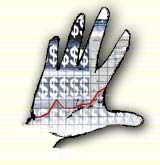 |
“Economists, on the whole, think well of what they do themselves and much less well of what their professional colleagues do. If a scholar probes deeply into a small section of the subject, he is fairly certain to mistrust, as superficial, the man who ranges more widely. The latter, in turn, will think the specialist lacking in vision or what is called reach. By knowing ever more about ever less, he will seem to risk becoming quite ignorant. Those who are mathematically inclined see others in retreat from rigor. The others think those who manipulate symbols impractical.
 The statisticians believe those who prove points deductively to be dangerously intuitive. But, by their colleagues, those who are controlled by numbers are often thought unduly cautious or even dull. It is exceedingly fortunate for the psychic health of the profession that inadequacy lies so uniformly with others. The situation in the other social sciences is said to be equally satisfactory.” (The New Industrial State)
The statisticians believe those who prove points deductively to be dangerously intuitive. But, by their colleagues, those who are controlled by numbers are often thought unduly cautious or even dull. It is exceedingly fortunate for the psychic health of the profession that inadequacy lies so uniformly with others. The situation in the other social sciences is said to be equally satisfactory.” (The New Industrial State)
What Invisible Hand?
Modern economics is based almost entirely on myths first pronounced by the 18th century moral philosopher, Adam Smith. His most famous myth is that the market is ruled by an Invisible Hand. In The Wealth of Nations (1776) he wrote that an individual
“generally, indeed, neither intends to promote the public interest, nor knows how much he is promoting it. By preferring the support of domestic to that of foreign industry he intends only his own security; and by directing that industry in such a manner as its produce may be of the greatest value, he intends only his own gain, and he is in this, as in many other cases, led by an invisible hand to promote an end which was no part of his intention….By pursuing his own interest he frequently promotes that of the society more effectually than when he really intends to promote it. I have never known much good done by those who affected to trade for the public good.”
 |
But, says philosopher Joseph Heath, seventeenth century philosopher Thomas Hobbes
“noticed—as many of us have—that when left to their own devices, people have a tendency to make a mess of things. His genius lay in the discovery that we do not necessarily make these messes because we set out to harm one another. Often the mess occurs simply because our attempts to secure our own self-interest are collectively self-defeating. So if our ‘natural’ inclination is to mind our own business and look after our own interests, then life in a ‘state of nature’ would be unbearable.”
Smith was writing during a mercantilist period, even before the Industrial Revolution had begun.
His ideas on economics are completely taken out of context and do not, can not, apply in the 21st century. This does not negate his importance as a moral philosopher, as shown in his otherwise neglected Theory of Moral Sentiments.
Unpredictability in economics
Economics historian Stephen Mihm gives us an initial perspective:
“Recessions are signal events in any modern economy. And yet remarkably, the profession of economics is quite bad at predicting them. A recent study looked at “consensus forecasts” (the predictions of large groups of economists) that were made in advance of 60 different national recessions that hit around the world in the ’90s: in 97 percent of the cases, the study found, the economists failed to predict the coming contraction a year in advance. On those rare occasions when economists did successfully predict recessions, they significantly underestimated the severity of the downturns. Worse, many of the economists failed to anticipate recessions that occurred as soon as two months later.”
 John Kenneth Galbraith |
In the same vein, Galbraith calls the Federal Reserve System the
"most prestigious form of fraud, our most elegant escape from reality…it has had a record against inflation and notably against recession of deep and unrelieved inconsequence….The belief that anything as complex, as diverse and by its nature personally so important as money can be guided by well-discussed but painless decisions emanating from a pleasant, unobtrusive building in the nation's capital belongs not to the real world but to that of hope and imagination. Here our most implausible and most cherished escape from reality. No one should deny those participating their innocently acquired prestige, their sense of personal competence, their largely innocent enjoyment of what in economic effect is a well-established fraud. Perhaps we should let their ineffective role be accepted and forgiven." (Economics of Innocent Fraud)
going on to say that
“Those employed or self-employed who tell of the future financial performance of an industry or firm, given the unpredictable but controlling influence of the larger economy, do not know and normally do not know that they do not know. Predictions from a financial firm, Wall Street economist or financial advisor as the economic prospect for a corporation—recession, scheduled recovery or a continuing economic boom—are thought to reflect economic and financial expertise. And there is no easy denial of an expert’s foresight. Past accidental success and an ample display of charts, equations and self-confidence affirm depth of perception. Thus the fraud. Correction awaits.”
Recall that the current recession was predicted by no economists at all. If any did, their voices were not heard.
What is economics?
In The Unnatural Nature of Science, Lewis Wolpert wrote: “The Nobel laureate [in economics] James Meade would like his tombstone to bear this epitaph: ‘He tried to understand economics all his life, but common sense kept getting in the way’.”
Joseph Heath:
 Joseph Heath |
“Markets really are efficient, vastly more efficient than any other form of economic organization. The pursuit of profit, under proper conditions, does generate collective benefits—win-win outcomes. Markets are quite amazing. But because this sounds so unlikely, the fans of global capitalism have had a marked tendency to overstate their case. After all, it is hard to imagine that haggling, price-gouging, profit-seeking, personal enrichment, usury, or any of the other rough-and-tumble practices of the marketplace have beneficial social consequences. Self-interest is usually bad. Why should this be any exception? As a result, proponents of the marketplace have been very reticent to admit that the market pattern of organization has any flaws or limitations. When combined with the utopian streak of many right-wing economists, this has given the debate over markets unnecessarily ideological and often quasi-religious overtones.”
“In a properly structured market, firms should be indifferent to environmental regulation. The problem is that markets are often not properly structured. As long as oil companies were making leaded fuel, they were not paying the true cost that the manufacture of their product imposed upon society. This is because of the negative externality—the airborne lead emissions. As a result, society was consuming ‘too much’ gas. Eliminating the externality should therefore reduce total demand for gasoline and increase the demand for other fuel sources. This is why the oil companies and refiners were opposed. They were profiting from the public bad. Thus opposition from business to regulation is often a sign that the regulation is a good idea and is likely to improve the overall efficiency of the economy.”
Milton Friedman:
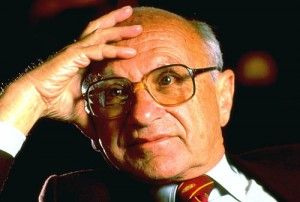 Milton Friedman |
“The major lesson of the Great Depression that has affected our lives is the wrong lesson, a misinterpretation of the Great Depression. There is no doubt that the major lesson [was] you…could not count on the private enterprise system to maintain prosperity and that you had to rely heavily on government to play a major role. If you take the period before 1929, so far as public opinion in general is concerned, government was regarded as a necessary evil. I think here was widespread support for the kind of views that Jefferson had expressed a century and a half earlier on the virtues of small government and of limiting the role of government. The Great Depression changed that because the lesson that the public at large learned from the Great Depression was that it was the result of a failure of business, a failure of capitalism,…and that in order to be safe in the future they would have to rely much more heavily on government. That was the lesson that was in fact learned from the Depression….[I]n my opinion, the lesson that should have been learned, the right lesson, was that government let them down. That it was mismanagement of the money system that produced it and not a failure of the market system.”
Some things never change
 |
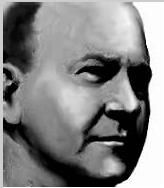 Vance Packard |
In 1960, Vance Packard wrote in The Waste Makers:
“A survey by insurance companies revealed that the average American family was about three months from bankruptcy. That was its cushion against disaster after two decades of unparalleled prosperity. For millions of families—especially for many living in suburban subdivisions—the brink of disaster was much closer. They were so pressed in meeting their host of monthly instalment charges that they were stopping smoking temporarily or putting their wives to work or seeking debt-consolidation loans, or all three.”
Overall, the situation is worse today for almost everyone.
Vision in economics
In the 1950s Senator Joseph S. Clark of Pennsylvania said:
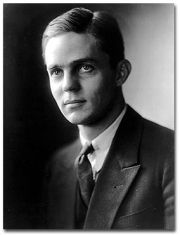 Joseph S. Clark, Jr. |
“The goal of our economy is not the production of more consumer goods at all. The goal of our economy is to provide an environment in which every American family can have a good house for living and shelter, a good school to which to sent the children, good transportation facilities and good opportunities for cultural and spiritual advancement.”
But just the opposite situation has evolved. Galbraith:
“The economy is geared to the least urgent set of human values. It would be far more secure if it were based on the whole range of need.”
“The income men derive from producing things of slight consequence is of great consequence to them. The production reflects the high total utility of a livelihood to a person. For this reason, although there is conventional wisdom to deny it, income and employment rather than goods have become our basic economic concern.”
This, he says, is because
“The individual serves the industrial system not by supplying it with savings and the resulting capital; he serves it by consuming its products. On no other activity, religious, political or moral, is he so elaborately and skilfully and expensively instructed.”
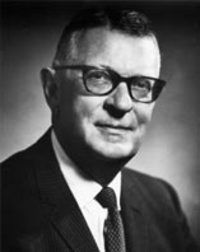 Charles (Charlie) Brower |
As BBDO president Charles H. Brower said in the 1950s: “The house of advertising is a mighty fortress in our economy….Pull down advertising, and a frightening number of things will fall with it.”
In our society it has become difficult, well nigh impossible, to step away from the system and live even a partial non-capitalist life. As Galbraith went on to say:
“As does the voter, the buyer has the right to exercise independent choice, to opt out. This some do; they resort to a lifestyle outside the system that is thought eccentric, even slightly insane. The existence and exercise of such choice does not lessen the force of market persuasion. Economics as taught and believed lags well behind the reality in all but the business schools.”
”Charity leads to the exploitation of the moral by the immoral”
Here are three observations by philosopher Joseph Heath from his 2001 book The Efficient Society:
“The fact that we are forced to pay taxes rubs some people the wrong way. But this is inevitable whenever it is necessary to do something as a group. In the case of the condominium association, people have no choice but to pay for the security guard at the front desk. In the case of the state, people have no choice but to pay for the [police]. In both cases, the freedom that is being restricted is nothing other than the freedom to free-ride. And that’s a freedom we’re all better off not having.”
“The material prosperity of Americans is due to the relatively unrestricted operations of the market economy in their society. It can cost a lot of money to make buildings beautiful. Once they are built, their beauty can be enjoyed for free by anyone who happens to pass by. Thus the enjoyment we all get from beautiful surroundings is largely a positive externality. As we have seen, market economies systematically underproduce goods with positive externalities. And so beauty suffers.”
“When I was living in Chicago, I once passed a homeless man on my way to school. It was the middle of winter, and he had no shoes. It made me feel ill. In some people, this feeling is strong enough that they are willing to donate some of their own money to charity in order to help relieve such suffering. Unfortunately, the fact that this preference is felt so strongly in some quarters gives others an opportunity to free-ride. People who don’t care much about other people can get away with not donating anything to charity. They still get all the benefits that poor relief generates—in terms of improved environment and security—yet pay none of the costs. Thus charity leads to the exploitation of the moral by the immoral.”
Economics as ideology
Joseph Heath’s first impression of economics was that it was a “crude right-wing ideology”. He says that as he learned more about economics, “a number of studies have since shown that studying economics can actually make you a bad person.” He added in a footnote that “in fairness, I should point out that these studies do not show that studying economics makes you a bad person. It may just be that bad people are more likely to be attracted to the study of economics. Anyhow, the truth probably lies somewhere in between.”
Milton Friedman: “The state might come back. The only reason free markets have a ghost of a chance is that they are so much more efficient than any other form of organization. When you argue for free markets, you are arguing against the trend. When something goes wrong, the natural tendency is to say, ‘by God, we need to pass a law and do something’.”
The idea that free markets “are so much more efficient” is an unsubstantiated, never proven assumption. As British writer Frances Wheen points out in Idiot Proof):
“there is no evidence for the contention that simple laissez-faireis the prerequisite for trade and prosperity. The IMF may say so, but its own figures tell a different story. Its report on ‘The World Economy in the Twentieth Century’, published in May 2000, includes a graph—printed very small, perhaps in the hope that no one would notice—which shows that the period between 1950 and 1973 was by far the most successful of the twentieth century. This was an era characterized by capital controls, fixed exchange rates, strong trade unions, a large public sector, and a general acceptance of government’s role in demand management. The average annual growth in ‘per capita real GDP’ through the world was 2.9 percent—precisely twice as high as the average rate since then.”
In fact, writes Heath,
“There is a tendency in our society to overestimate how easy it is to put together a market. We are sometimes told that markets will spring up naturally whenever people are left free to trade. Nothing could be further from the truth. Markets are extremely sophisticated legal constructions. Furthermore, getting them to work properly requires people to think about their society in a very counter-intuitive way. As a result, markets represent a very unobvious and improbable institutional development (If they weren’t so unobvious people would have thought of them long ago.) The central virtue of markets is that they allow individuals to organize productive activities using far less information than any other type of economic institution. They allow us, in a sense, to solve the basic problems of our economy without actually working out a solution. Precisely how they do this is the question that has fascinated economists for the last two hundred years.”
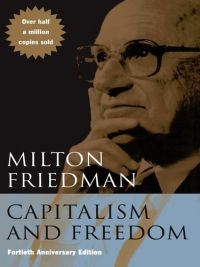 |
In his book Capitalism and Freedom, conservative Nobel economist Milton Friedman argued that “a central element in the development of collectivist sentiment…has been a belief in equality as a social goal and a willingness to use the arm of the state to promote it.” What is the justification for state intervention? he asked. “The ethical principle that would directly justify the distribution of income in a free market is, ‘To each according to what he and the instruments he owns produces.’ The operation of even this principle implicitly depends on state action. Property rights are matters of law and social convention. As we have seen, their definition and enforcement is one of the primary functions of the state. The final distribution of income and wealth under the full operation of this principle may well depend markedly on the rules of property adopted.”
Simon-Henri Linguet, a lawyer in pre-Revolutionary France, was disbarred from practice because he was critical of both the law and property. He said:
 Jacques Necker |
“Laws are destined above all to safeguard property. Now as one can take away much more from the man who has than from the man who has not, they are obviously a guarantee accorded the rich against the poor. It is difficult to believe, and yet it is clearly demonstrable, that the laws are in some respects a conspiracy against the majority of the human race.”
Jacques Necker, controller of finances, was fired on the eve of the French Revolution: “Almost all civil institutions have been made by property owners. One might say that a small number of men, having divided the earth among themselves, made laws as a union and guarantee against the multitude.”
In Emile, the French philosopher Jean-Jacques Rousseau wrote: “The universal spirit of laws in all countries is to favour the stronger against the weaker, and those who have against those who have nothing; this disadvantage is inevitable and without exception.”
This is echoed today by no less a personage than Col. Muammar el-Qaddafi (Libyan dictator as of this writing) who said in his Green Book: “This is genuine democracy, but in reality the strong always rule.”
In The Social Contract Rousseau said that the 17th century thinkers, Hugo Grotius (jurist) and Thomas Hobbes (philosopher) “show us the human race divided into herds of cattle, each with a master who preserves it only in order to devour its members.”
Economics of a “Christian” nation
Joseph Heath wrote:
“St. Matthew had a number of good lines. My favourite is his somewhat infamous principle of justice: ‘To everyone who has will be given, and he will have abundance, but from him who has not, even that he has will be taken away. Throw out the unprofitable servant into the outer darkness, where there will be weeping and gnashing of teeth’. This passage occurs in the so-called ‘parable of the talents’, in which Jesus appears to endorse a number of very dubious moral principles.”
Conclusion: The original affluent society
In the 1960s, anthropologist Marshall Sahlins argued that our society had “erected a shrine to the Unattainable: Infinite Needs,” submitting to capitalist discipline and competition to earn money so we can chase those infinite needs by buying things we don’t really want. We could learn something, Sahlins suggested, from the pre-agricultural, hunter-gatherers of ten thousand years ago. “The world’s most primitive people,” he wrote, “have few possessions but they are not poor.” This only sounds like a paradox, for Sahlins went on to point out that foragers typically worked twenty-one to thirty-five hours per week. Hunter-gatherers did not have cars or TVs, but they did not know they were supposed to want them. Their means were few but their needs were fewer, making them, in Sahlins view “the original affluent society.”
This is a somewhat simplistic observation but it contains the kernel of a profound truth. Their lives, by our standards, were short and in many ways uncomfortable (understatement?). If they had had medicines and medical techniques that would have rid them of curable diseases and let them live longer and more comfortably, there still would have been no need for them to pursue useless material goods. Excess consumption is an artificial situation promoted by the capitalist system, i.e., by property owners whose only goal is to increase their property and maintain their dominance over their workers.
As Galbraith wrote:
“To be guided by the belief that everyone should work a standard week and year—is to make the needs of the industrial system, not the opportunity of the individual to fashion his own existence, the ruling social concern. Men who speak of liberty should allow and even encourage it.”
 Daniel Johnson was born near the midpoint of the twentieth century in Calgary, Alberta. In his teens he knew he was going to be a writer, which is why he was one of only a handful of boys in his high school typing class — a skill he knew was going to be necessary. He defines himself as a social reformer, not a left winger, the latter being an ideological label which, he says, is why he is not an ideologue. From 1975 to 1981 he was reporter, photographer, then editor of the weekly Airdrie Echo. For more than ten years after that he worked with Peter C. Newman, Canada’s top business writer (notably on a series of books, The Canadian Establishment). Through this period Daniel also did some national radio and TV broadcasting. He gave up journalism in the early 1980s because he had no interest in being a hack writer for the mainstream media and became a software developer and programmer. He retired from computers last year and is now back to doing what he loves — writing and trying to make the world a better place
Daniel Johnson was born near the midpoint of the twentieth century in Calgary, Alberta. In his teens he knew he was going to be a writer, which is why he was one of only a handful of boys in his high school typing class — a skill he knew was going to be necessary. He defines himself as a social reformer, not a left winger, the latter being an ideological label which, he says, is why he is not an ideologue. From 1975 to 1981 he was reporter, photographer, then editor of the weekly Airdrie Echo. For more than ten years after that he worked with Peter C. Newman, Canada’s top business writer (notably on a series of books, The Canadian Establishment). Through this period Daniel also did some national radio and TV broadcasting. He gave up journalism in the early 1980s because he had no interest in being a hack writer for the mainstream media and became a software developer and programmer. He retired from computers last year and is now back to doing what he loves — writing and trying to make the world a better place
Articles for February 23, 2011 | Articles for February 24, 2011 | Articles for February 25, 2011




googlec507860f6901db00.html
Salem-News.com:
Terms of Service | Privacy Policy

All comments and messages are approved by people and self promotional links or unacceptable comments are denied.
A random scandinavian September 2, 2021 1:34 am (Pacific time)
You're a king Johnson! : ) History will remember all these small actions from critically thinking people! : )
John Steinsvold August 21, 2012 6:51 pm (Pacific time)
An Alternative to Capitalism (if the people knew about it, they would demand it)
Several decades ago, Margaret Thatcher claimed: "There is no alternative". She was referring to capitalism. Today, this negative attitude still persists.
I would like to offer an alternative to capitalism for the American people to consider. Please click on the following link. It will take you to an essay titled: "Home of the Brave?" which was published by the Athenaeum Library of Philosophy:
http://evans-experientialism.freewebspace.com/steinsvold.htm
John Steinsvold
“Insanity is doing the same thing over and over and expecting a different result."
~ Albert Einstein
Einstein said no such thing. People just take unattributed quotes like that and figure if they attach a genius name to it, people will take it seriously. But the saying makes excellent sense, no matter who said it.
HANK RUARK February 25, 2011 9:23 pm (Pacific time)
P.L.:
You forgot to mention what and where you've edited, or what you've written, or where you've taught about productive, creative writing on complex areas such as economics.
Please now inform us where to send your diploma for inane, outright silly, and insulting pseudo-criticism.
With a base like that, you should be able to accommodate return of space ship now on way into larger universe.
HANK RUARK February 25, 2011 9:07 pm (Pacific time)
Paul L,:
"Conservatives" buried by neoc's long time ago, Leyton...where you been, friend P. ??
Re "momentum:, may apply to railroad or other vehicles, but here is outta place, dismoded and dismembered, too.
Watch how the whole union movement is regenerated by these out of sense attacks...democracy needs the unions and we do well to aid and protect them from anti-sensers.
Hank Ruark February 25, 2011 7:25 pm (Pacific time)
DJ.: Again, a great one...much needed for many of us.
I was feeling lonely, frustrated and put-upon by continuing too-apparent
confusion(s) (definitely plural !) until you shared those magnificent quotes.
We are honored to publish such standards-setting content, and I look forward to "the book", of which this is surely --or should be-- the core.
Best to you Dan, and keep right on perkin'up such strong brew...
Thank you, Hank.
Paul Leyton February 25, 2011 6:11 pm (Pacific time)
This article is a meandering trip to absolutely nowhere. Even a first year economics student could outline something with at least a little relevance and structure. Maybe the writer should just admit that he wants a massive re-distribution of all wealth, which means that he opines for anarchy...You guys always keep saying the same stuff, and no matter how you try to dress it up, it's still nothing more than GIGO. You have lost the momentum, it's over. The conservatives have come back into power and will completely remove our enemies from having a chance to harm our citizens anymore. Watch how the public unions here, and the left in Canada starts decaying in the next year. Good trumps evil is an axiom.
A "meandering trip" to the very last quote by Galbraith, which is the point of it all. Fascists believe (a) they have the absolutely correct answer and (b) all opposition must be crushed and destroyed (lest the absurdity of the absolute become apparent).
"Good trumps evil is an axiom". Really?. A superficial surfing of history refutes that: Hitler, Pol Pot, Idi Amin, Saddam Hussein, Moamar Gaddaffi, Mugabe,(and a long list going back in history) sorry, not much of an axiom. Pretty obvious that you failed History 101.
I should add that my articles are not intended for the gormless.
[Return to Top]©2026 Salem-News.com. All opinions expressed in this article are those of the author and do not necessarily reflect those of Salem-News.com.